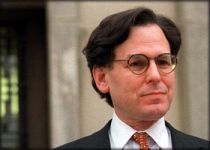Classic Sidney Blumenthal: A Must Read genre: Just Jihad & Polispeak & Six Degrees of Speculation

I've always found Sidney Blumenthal to be both thoughtful and insightful and his interview in Los Angeles CityBeat doesn't disappoint. He brings a wealth of knowledge and his ability to project how current issues and the associated players will be viewed historically is formidable. In my opinion, he is unmatched in his ability to articulate the big picture. I've provided some excerpts but I would encourage readers to read the entire interview.
In How Bush Rules: The Chronicles of a Radical Regime (Princeton), Blumenthal collects much of that work into a document of the George W. Bush years, a "real time" chronology of missteps and misinformation that very often reads like an indictment of our current president and the GOP. It is the story of an imperial presidency, a time of one-party rule and a collapse of the crucial checks and balances provided for in the Constitution.
CityBeat: How long have you viewed the Bush administration as a "radical regime?"
Sidney Blumenthal: During the Reagan period, I covered the conservative movement and Iran-Contra and the Reagan White House for the Washington Post and spent a lot of time with the neo-conservatives. In the elder Bush administration, they were not allowed in. And when I saw them coming back, I had a very clear idea of what they were all about, and that at least in foreign policy would be very radical.
Is the Cheney that you knew back in the '80s the same as he is now?
The Cheney I knew had hard-right instincts and has moved systematically hard-right .... Cheney went from facilitating [Newt] Gingrich and the so-called Republican revolution to an alliance with the neo-conservatives. And that was facilitated by his wife, Lynn Cheney, who had been far-right chairman of the National Endowment for the Humanities. I call her Madame Mao. She was at the American Enterprise Institute, where all these neo-conservatives were clustered. Cheney really got to know them well, and saw in them a network that he could put in place.
Popular opinion is now overwhelmingly opposed to the Iraq war. Why has it taken this long?
Historians are going to ask this question. There was a study done on voters by the University of Maryland on the parallel universes of Kerry and Bush supporters, which says people who supported Bush had a completely different set of facts. The vast majority of them believed Saddam Hussein was involved in Al Qaeda and 9/11, that there were WMD in Iraq - and that they had been found.
There were a lot of people who persuaded themselves that what Bush was doing would last forever politically, and they aligned themselves with Bush, including parts of the press corps. They convinced themselves that Karl Rove was a genius and all this was the result of his genius political strategy. And Bush was a stalwart person of profound conviction. And they thought it was all going to work.
It looks like we're about to enter into an interesting period following this election.
We're headed into a potential constitutional crisis if the Democrats get one or both houses of Congress. They will certainly have subpoena power and I think the Bush administration is likely to resist the production of documents.
The idea in my book is that Bush has created a radical presidency that is unaccountable. And if a check-and-balance is introduced for the first time to Bush, instead of one-party rule, we're going to have another crisis. The conflict will increase, not diminish. As Bette Davis said, "Fasten your seatbelts. It's going to be a bumpy ride."
What is remarkable about Blumenthal's remarks is his prescience. When he suggests that the real constitutional crisis will take place if and when the Democrats take a majority in the House or the Senate. To this point, Bush and Cheney have been successful in expanding the power of the executive branch...but look for a donnybrook if the Democrats decide to rollback some of these obvious excesses. More importantly, look for a number of Republicans to abandon the President in the ensuing battle. In my opinion, should the Democrats gain control of the House and possibly the Senate, the significance of the 2006 midterm election will be viewed retrospectively as a focal point in American history.
There have been recent reports that the President and those close to him have refused to consider the ramifications of a Democratic victory in November. There are two ways to view what GOP operatives have sought to portray as optimism on the part of the President. One perspective is that it's essential for the head of the GOP to appear confident in order to motivate the Republican base. The second explanation is far more complex. It suggests that this President actually believes that fate and faith have led him to this historical juncture and as such he serves as the designated warrior for the vision of a higher power. Blumenthal doesn't go this far in his prediction...but if I were a gambler, I'd bet he expects nothing less.
Post a comment